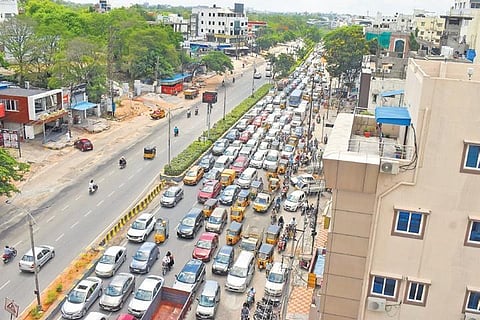

HYDERABAD: The four-hour relaxation period appears to have become counter-productive to the very objective of lockdown — to arrest the spread, and bring down the incidence of Covid-19.
Every day from 6 am, the city bursts into economic and social activity, compressing and capturing the entire day’s activity in a short span of four hours.
While traders and vendors are happy that economic activity is running uninterrupted in those four hours, experts are worried about indisciplined crowds without spilling out onto the roads without wearing masks or maintaining social distance.
Several commercial hubs in the city, like Jagdish Market, Madhapur, Kukatpally, Ameerpet, Charminar, various Rythu bazaars are brimming with people in the four-hour phase, so much so that the traffic in these areas takes about an hour to clear after the lockdown hours come into force at 10 am.
Huge rush from 7.30-9 am
In Hyderabad, there are more than 2.50 lakh street hawkers and vendors who do business on the roads, where people throng to make purchases. As per the Telangana Street Vendors and Hawkers Association, most of the rush is seen only between 7.30 and 9 am at these places. “The vendors cannot stop the heavy rush as the relaxation bracket is for a short duration. The only way it can be maintained is by extending the relaxation period,” says S Venkat Mohan, State president, Telangana Street Vendors and Hawkers Trade Union.
Police say that they have been effectively enforcing Covid-19 appropriate behaviour during the four-hour window, but the situation on the ground shows a different picture. They say that the first lockdown in 2020 was completely different from the situation now. Nonetheless, they are trying to inculcate discipline in crowds. Says Rachakonda Police Commssioner Mahesh Bhagwat: “Anyone who violates rules is booked and action taken. After the relaxation period is completed, all officers are distributed to checkpoints and patrolling.”
Lockdown 2020 rules better
A few police officials recall that the lockdown in 2020 when except for establishments selling groceries, vegetables and a few other essentials, others used to be closed and people were allowed to travel only within 2km radius for any purchase. “The police department which was at the forefront in enforcing the lockdown, did it very strictly, But not anymore,” said one official.
The State has to save lives and livelihoods, but the tasks are antithetical in nature. “While Telangana has more or less struck a reasonable balance between the two, it is important to ensure some restrictions that enforce Covid-19 appropriate behaviour among the people,” says Dr Subodh Kandumuthan, Director of Centre for Health Care Management at Administrative Staff College of India.
Staggered timings would help: experts
Dr Subodh explains that allowing all commercial activity in four hours visibly increases chances of overcrowding and some restrictions need to be in place to spread out the crowds.“The local municipality, like GHMC, must make these rules. Either they must stagger the timings of operation — starting with milk and groceries in the morning, and then open up others like banks. Commercial establishments can open from 8 am onwards. So, on any given street, there will only be one commercial establishment open,” explains Dr Santosh Kraleti, senior Public Health Expert and member of National Medical Council (NMC).
He stressed upon how several rules made by the GHMC in 2020 lockdown must be reintroduced. “The lockdown is helping the State for sure as a marginal decrease in hospitalisations is already being seen. However, some more tightening of rules must be in place. Last year, GHMC had experimented with odd-even opening of stores and also opening of one side of the street in staggered timings. The idea is to ensure that between any two commercial establishments, there is a gap of 15 feet. Such rules can greatly cut the rate of transmission in the open hours,” adds Dr Kraleti.
Limit radius of travel
The experts also note that uninterrupted travel in the four-hour open period must be discouraged and travel for essential purposes alone must be allowed as it was in 2020. “There are a couple of super- spreading areas we noticed in both waves — Rythu bazaars and restaurants. Both these are crowd pullers and bring in public from across the city. Some restrictions must be there like travel only within 5 km radius etc to ensure unnecessary vehicular traffic is not attracted,” adds Dr Subodh.
They note such measures are crucial as evidence is showing that unlike the first wave when a 15-30 minute exposure with a carrier caused Covid-19, now an exposure of 2-4 minutes is enough to contract the virus. “In roadside eateries especially, people remove masks and eat in close proximity where aerosol transmission can happen.”
Meanwhile, a major policy level shift the citizens and experts alike are demanding are the mobile Rythu bazaars. In the 2020 lockdown, GHMC had brought in nearly 300 such vehicles to cover 1,000 locations in a day, which helped disperse crowds from local markets.
“Such initiatives are crucial to contain the surge. One more important step is to involve citizens in all containment activities. Ward-level information dissemination is crucial to make the best use of such restrictions,” added Major Shiva Kiran, UFERWAS. (With inputs from Pinto Deepak and Ridhima Gupta)
What experts recommend
PETROL BUNKS TO STAY OPEN ALL DAY
The State government on Wednesday exempted petrol bunks from the lockdown. The bunks will now stay open round the clock in the State. Hitherto, petrol bunks in the State, except those located on National Highways, were functioning from 6 am to 10 am. “The Government hereby relaxes the timings of fuel stations/retail outlets in urban and rural areas for operating in the normal working timings during the day, since the procurement of paddy is going on in the State and trucks have to be operated for shifting paddy from the paddy purchasing centres to the designated rice mills and in view of agriculture demand and emergency service vehicular requirement,” the circular issued by the government said.